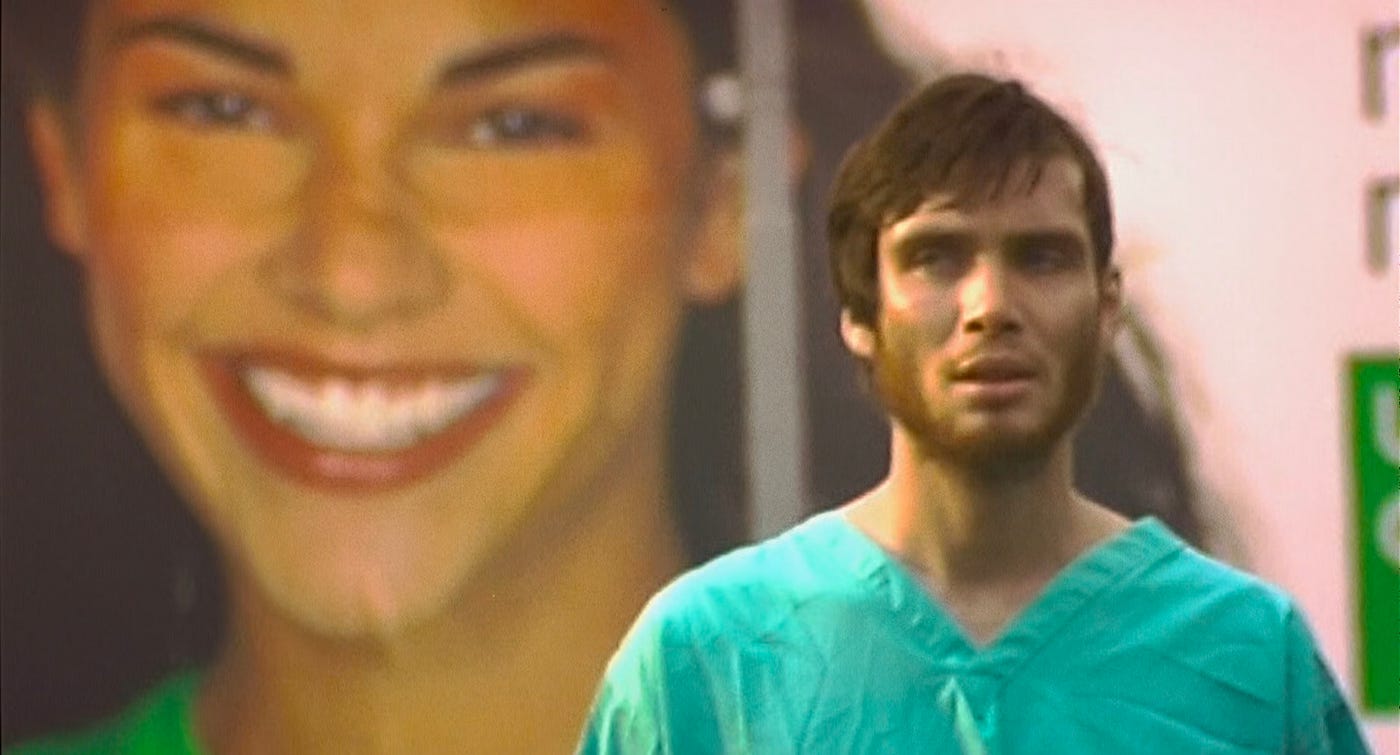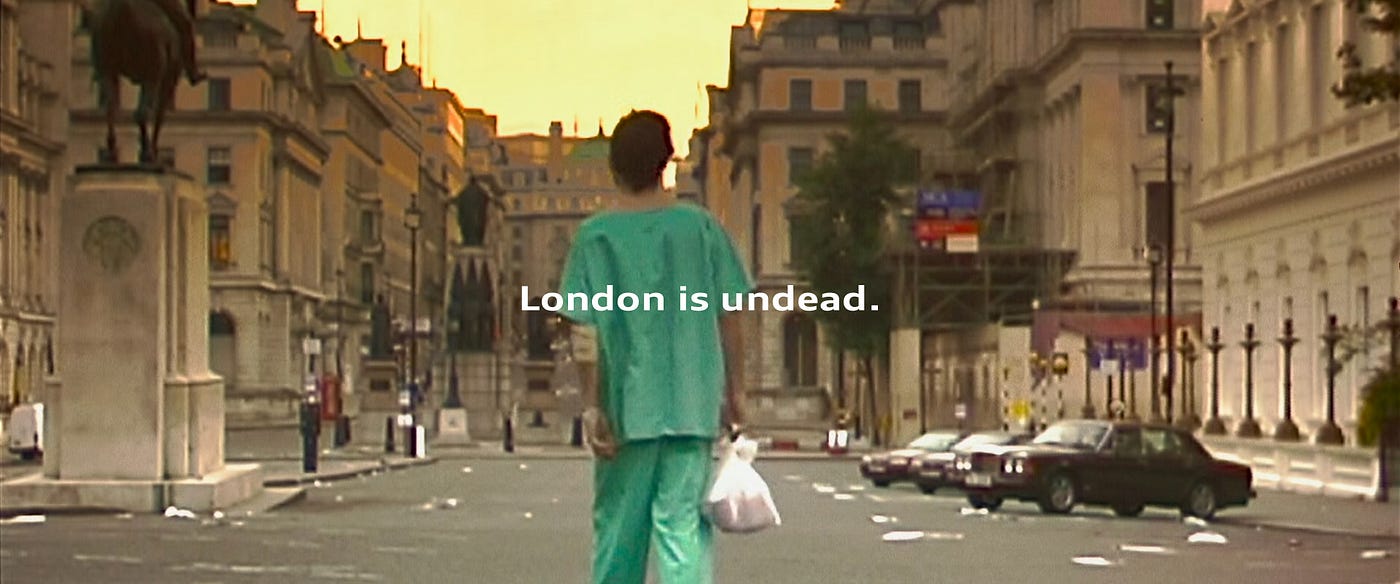Advertising Is How Corporations Dream

Advertising creates “an entirely different world organically connected to this one” (Amari Bakari). In ads people do ordinary things—like having periods or washing or driving cars—but in an entirely different world. In a world like ours, but uncannily not.
Watching an ad is like watching a corporation dream. Waking up, however, you realize. It’s a living nightmare for human beings.

Take this Audi ad, featuring Regé-Jean Page from Bridgerton fame. Page drives through an empty city, all focus on the car. Like every car ad, there is no traffic in this city, no parking problems, no people even. Page is alone on the roads, he parks right in front of the building, he zooms off to the horizon.
This is a recurring dream in corporate advertising, but in human cinema the same situation is a recurring nightmare. Take two movies, Devil’s Advocate and 28 Days Later.

In Devil’s Advocate (spoiler alert) the streets empty out when Keanu Reeves figures out that Satan is his father. There is no traffic because all humanity is gone. It’s terrifying.

Then take Cillian Murphy in 28 Days Later. He walks through an empty London that would be perfect (a bit cleaned) up for a car ad. But it’s empty because zombies have eaten everyone. It’s the start of a horrorshow.
As you can see, cities without people are a dystopia for humans and a utopia for corporations. A cinematic nightmare and an advertising dream. The same scene that’s a fantasy during the commercial break is pure horror when the movie comes back on.
The entire parallel universe of advertising is like this. Advertising creates a universe where women menstruate blue, where creams turn Indians white, and where consuming cars become green. This surrealism is somehow expected during the commercials, but in the cinema we’d consider it a fright. The cinema is right.
Electric Sheep
The Audi ad, for example, is using our terrifying future to sell a fucking electric car. They say “future is an attitude” when no, it’s really not. Future is a temperature and it’s getting hot.
Audi is selling two tons of lithium and steel like a papal indulgence. The idea that you can buy your way out of climate collapse, instead of giving up your armored living room and getting your ass on the bus.
As the late Mark Fisher wrote, “Climate change and the threat of resource-depletion are not being repressed so much as incorporated into advertising and marketing... environmental catastrophe features in late capitalist culture only as a kind of simulacra, its real implications for capitalism too traumatic to be assimilated into the system.”
Page is driving through this simulacra, this corporate dream. It’s stunning because you can watch the creatures dream. Modern TV lets you peer into the corporate subconscious through these ‘climate conscious’ ads. The dream is that we can have our climate cake and eat it too. The truth is that through endless consumption, we are consumed.
As Fisher said, “The fantasy being that western consumerism, far from being intrinsically implicated in systemic global inequalities, could itself solve them. All we have to do is buy the right products.”
It is a fantasy, of course, that we can buy our way out of systemic problems with consumer choices. As Fisher said, “the ideological blackmail that has been in place since the original Live Aid concerts in 1985 has insisted that ‘caring individuals’ could end famine directly, without the need for any kind of political solution or systemic reorganization.”
And thus we get the tagline of the Audi campaign, “future is an attitude.” This is precisely how Žižek described the ideology of capitalism, and that’s what comes out when it’s dreaming. As Fisher summarized, “capitalist ideology in general, Žižek maintains, consists precisely in the overvaluing of belief — in the sense of inner subjective attitude — at the expense of the beliefs we exhibit and externalize in our behavior. ”
No place are beliefs more overvalued than in a dream. That’s all a dream is, your beliefs creating the experience of reality. And what do corporations dream of? Well, androids dream of electric sheep.
Commercial Break
This is what we watch on TV—in between our own nightmares of the future, our own news of the dismal present—we have corporations telling us selling us dreams. The representation gets more woke, but the narrative is still asleep. So we get the hot young star of Bridgerton, cruising around a dystopian city, telling us to vibe our way out of climate collapse.
He says,
one of the best things about life
is that we keep moving forward.
I love that we’re constantly evolving.
We progress. Every day.
We discover exciting new technologies
redefine who we are
and how we want to lead our lives.
Basically
we choose what we want our future to look like.
So, what’s yours going to be?
I don’t mean to shit on Page, get your bag young man. These aren’t his words, these are the words of corporate AI, passing through the cogs of a human committee, coming out of a young black man’s mouth. As Pink Floyd said,
Welcome, my son
Welcome to the machine
What did you dream?
It’s alright, we told you what to dream
We all watch these corporate fever dreams while the Earth actually burns. We all sleep perchance to dream. We dream that we can move faster than 8 MPH in a city. Dream that lithium is going to cure our oil addiction. Dream that the future really is an attitude, and that nature gives a fuck about our feelings.
We watch these corporate dreams every commercial break—between bad news of the present and worse movies about the future—and then just go back to sleep. In an ad, a deserted city is a utopia, but in a movie, it’s a dystopia. Like any dreamer, we believe whatever reality we’re in at the moment and forget the other one immediately.
And yet as Midnight Oil sang “how do we sleep, while our beds are burning?” We simply won’t be able to sleep much longer, dreaming of electric cars. We will all wake, soon enough, to the smell of our own burning flesh.
The truth is that advertising doesn’t just create “an entirely different world organically connected to this one.” Capitalism destroys the organic world, in a fever dream we are simply too late to wake up from.